Social media has totally changed the way people learn about personal finance management. Many financial influencers, also known as finfluencers, share their advice online on the internet about saving, investing, and also about the best way to manage money. Lear how SEBI Crackdown on Finfluencers Impact on Personal Finance Advice in 2025
But not everyone out there are experts. That’s why to protect people from misguidance, SEBI (Securities and Exchange Board of India) has begun governing this space.
Why SEBI Is Targeting Finfluencers
Finfluencers upload content on platforms like YouTube, Instagram, Facebook, and X (Twitter) related to personal finance. As some post helpful content, many are trained professionals. SEBI is concerned about following things:
Unqualified Advice: Only few out of many financial influencers are registered to SEBI, which means most of them are giving advice on social media without any certification.
Stock Manipulation: Some encourage some specific stocks to boost the price, then sell their own shares for profit, which hurts the common investors.
No Disclosure: About 63% of people don’t tell their viewers that they are being paid to encourage something.
No Accessibility: Finfluencers who are not registered with SEBI are not kept to the same standards as the licensed advisors.
To fix these major issues, SEBI released some new strict rules in 2025 and one huge change came in January 2025 by directly banning the live stock market data in educational contents. You can find the official SEBI circular here.
Key Changes in Online Financial Advice
New rules of SEBI mainly focus on making financial advice more reliable and here is how things are changing:
SEBI Registration Needed: If someone is giving advice related to finance on social media, then they need to register themselves with SEBI.
No Real-Time Data: From now on financial influencers can only share data which is at least 3 months old.
Limited Tie-ups: If someone is not registered with SEBI, then they can’t work with any brokers and mutual funds.
Clean-Up Drive: More than 15,000 websites including videos from unregistered content creators were taken down in 2024.
Clear Disclosure: Financial influencers must tell their viewers if they are being paid to promote a product or not.
Impact on Investors and Finfluencers
If you are a regular investor, then these major changes can really help you make your personal finance safe. But some useful free content may vanish because many finfluencers may quit or go offline.
For financial influencers, deals on brands have fallen by up to 60%. From now on, they either have to create better, honest content or simply get approval from SEBI. To better understand the rules, investors can also explore SEBI’s investor awareness portal.
Tips for Safe Personal Finance Management
If you want to stay safe from online financial misinformations and find the best way to manage money, then make sure to follow these steps:
Verify if the financial influencer is registered with SEBI or not.
Cross-check the advice you get from influencers by researching reliable sources.
Make sure to keep distance from getting rich quickly.
Always keep your focus on long-term personal finance management like mutual funds and diversification.
Read more about Smart Ways to Protect Personal Finances in Times of Economic Uncertainty
Conclusion
SEBI’s crackdown makes the online financial world secure. Even though some contents may disappear, the advice that stays will be more reliable and trustworthy.
Make sure to stick with SEBI-registered experts and informed choices to improve your personal finance journey.


1 thought on “How SEBI’s Crackdown on Finfluencers Is Changing Financial Advice Online”